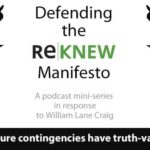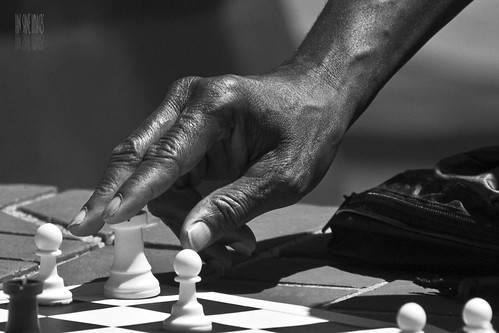We run our website the way we wished the whole internet worked: we provide high quality original content with no ads. We are funded solely by your direct support. Please consider supporting this project.
Open Theism: A Basic Introduction
On Monday and Tuesday, Greg explained Molinism and contrasted it against the open view of the future. (Click here for part 1). Because many see the open view as a limited view of God, it’s helpful to be clear that this has less to do with the nature of God and is about the nature of the future. In his book, Satan and the Problem of Evil, Greg explains the open view of the future in this way:
________________________
With the whole of the Christian tradition, [the open view of the future] affirms that God is omniscient, knowing the past, present and future perfectly. But it also affirms that the future decisions of self-determining agents are only possibilities until agents freely actualize them. In this view, therefore, the future is partly comprised of possibilities. And since God knows all things perfectly — just as they are, and not otherwise — God knows the future as partly comprised of possibilities.
The open view of the future thus affirms that in creating the world God faces the possibility, but not the certainty, that free creatures would choose to oppose him to the extent that they have. This view thereby allows us to consistently affirm that God entered into a somewhat risky endeavor in creating the world. … (91-92)
We might compare this view of God to a master chess player. We would ordinarily consider a chess player to be insecure to the extent that she would need to know ahead of time, or control if possible, all the moves of her opponent to ensure winning a match. Conversely, we would ordinarily consider a chess player wise and confident to the extent that she could ensure victory without relying on these aids. Her confidence is rooted in her ability to wisely anticipate all possible future moves her opponent might make together with all the possible responses she may make to each of these possible moves. She does not know exactly how many moves she will have to make, or what these moves will be, before the match begins, for she does not know exactly how her opponent will move his pieces. If her opponent is formidable, she may even have to place certain pieces “at risk” in order finally to checkmate him. But by virtue of her superior wisdom she is certain of victory. And precisely because her victory does not come from having a blueprint of her opponents moves or otherwise controlling her opponents moves, the wisdom she displays in achieving her victory is praiseworthy.
This is, of course, an analogy. In reality, no humans can come close to foreknowing every possible combination of moves they and their opponents might make throughout the course of every conceivable match. These possibilities do exist ahead of time, however, so the omniscient God of course perfectly knows them. Indeed, to apply the analogy to the real world, we must conceive of God foreknowing and perfectly anticipating from all eternity every possible event that might come to pass. For whatever in fact comes to pass was logically possible from all eternity. Consequently, God would eternally know it as such.
But this vast foreknowledge is of possibilities not of future certainties. God may (and does) sovereignly delimit these possibilities as he sees fit by decreeing the parameters within which free agents can make decisions. There is no “risk” he enters into that he himself did not choose. But in the open view of the future he does not restrict these possibilities to one certain course of action. While that would be a risk-free course of action, it would rule out freedom, which in turn would real rule out the possibility of love. (113-114)
Category: General
Tags: Foreknowledge, Open Theism, Satan and the Problem of Evil, Warfare Worldview
Topics: Open Theism
Related Reading

Podcast: Defending the Manifesto (6 of 10)
Greg responds to challenges by William Lane Craig from Craig’s podcast “Reasonable Faith.“ Greg denies Molinism and discusses the logic of possibility. http://traffic.libsyn.com/askgregboyd/Episode_0061.mp3

How do you respond to Isaiah 53:9?
Speaking of the suffering servant Isaiah says, “[T]hey made his grave with the wicked and his tomb with the rich…” As with most evangelical exegetes, I believe that Isaiah 53 constitutes a beautiful and stunning prophetic look at the person of Jesus Christ. The most impressive feature of this prophecy is that the suffering servant…

Neo-Molinism and the Infinite Intelligence of God
Classical Molinism holds that, since God is omniscient and knows all truths, he knows not only what every agent will do in the future, but also what every agent would have done in every other “possible world.” In this essay I argue that classical Molinism overlooked a whole category of truths that an omniscient God…

What is the significance of Genesis 22:12 ?
Abraham passed God’s “test” (vs. 1) by being willing to sacrifice his son. The Lord says “…now I know that you fear God, since you have not withheld your son…” If the classical understanding of foreknowledge is true, God’s statement “now I know” seems disingenuous. The meaning of God’s explanation for this knowledge — “since…

Isn’t it true that God doesn’t know the future in the open view?
This is the single most common misconception people have about the open view. Open Theists and Classical Theists disagree about the nature of the future, not about how much God knows about it. Both sides grant that God knows everything. He is omniscient. He knows everything there is to know about all of reality, including…

The Cosmic Dance Origin Story
In this video, Greg introduces The Cosmic Dance, by explaining what motivated him to write this quirky little book. If you live near the Twin Cities, come to the launch party Friday June 24th where you can purchase the book at a discounted rate. Click here for information on the launch party.

